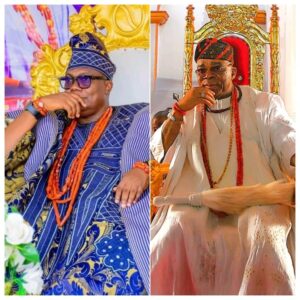By Itafa Olayemi Olaboye
The recent wedding events of Aisha Belgore brought to fore the rich culture of the Fulani people (of ilorin stock). Despite the aristocrat background of the bride, the traditional culture took a prime position in the weeklong event. Cultural activities infused into the event are: Sisa (migration of the bride), Ere Ọsan (Afternoon merriment), Ijo Ọlọmọ Ọba (Royal family dance), all climaxed with the bride dressed in the Fulani attire (fantoje, brass anklets, henna and the Fura bowl on her head) as she danced to the Kengbe songs from the family folk ensemble.
Beyond the danceable tunes from the kengbe women group, there are so many historical records woven into the various songs rendered. Only discerning minds can thoroughly decipher the messages therein. Did I tell you the bride’s head was not only uncovered but her hairdo was strewn with cowries. That is fulani culture despite the strong Islamic background of the Before family.
In Yoruba culture too, weddings are a grand celebration of love, family, and heritage. One of the most significant aspects of Yoruba weddings is the rich cultural content that is woven into the ceremony. One such beautiful tradition is the Bridal Chant, known as ẹkun Iyawo (Rara sísun) in Yoruba.
Ẹkun Iyawo is a poetic chant sung by the bride, her friends and family members, praising her beauty, grace, and virtues. This chant is a significant part of the wedding ceremony, as it symbolizes the bride’s transition from her father’s house to her husband’s. The chant is usually sung in a call-and-response pattern, with the lead singer extolling the bride’s qualities and the others responding in harmony.
The lyrics of ẹkun Iyawo are steeped in Yoruba cultural values, emphasizing the importance of marriage, family, and community. The chant also invokes the blessings of the ancestors and the gods, seeking their protection and guidance for the couple. Through this chant, the Yoruba people celebrate the union of two families and the beginning of a new chapter in the couple’s life (please read further on this in *Itafa: The formative years (2016).*
In modern Yoruba weddings, ẹkun Iyawo is often blended with Islamic or Christian elements, reflecting the cultural and religious diversity of the community. However, the traditional chant remains an integral part of the ceremony, connecting the couple to their rich cultural heritage.
By embracing and celebrating Yoruba cultural contents like ẹkun Iyawo in weddings, we honor our ancestors and preserve our cultural traditions for future generations. The beauty of Yoruba weddings lies in their unique blend of tradition, culture, and joy, making them a truly unforgettable experience.
However, we are fast losing the rich heritage bequeathed to us by our ancestors on the pretense of being adherents of modern religions. We seriously need a rethink about the fast erosion of our cultural values through the embrace of the foreign cultures.







